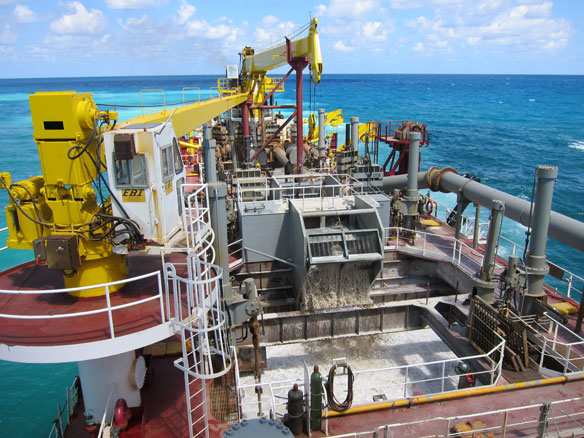
Onboard a sand dredger, Miami, Florida.
“Sand is the second most consumed natural resource, after water…”.”Captions and Photograph by “Sand Wars” Award-Winning Filmmaker: Denis Delestrac. ©2013
As of 2011-2012, when investigative filmmaker Denis Delestrac and team, were collecting and unveiling sand mining datas and information from the professionals involved, “…the sand business was estimated to be a $70 billion industry, worldwide…!”—Denis Delestrac (©-2013)
Excerpts;
A study from the National Marine Fisheries Service says a few more endangered sturgeon and sea turtles have been killed as a result of the dredging in the Savannah River…
“What this report shows us is that the number of endangered species out there is actually more robust than originally thought…”
Read Full Article; WSAV (10-31-2017)
A variety of maritime activities contribute to sea turtle deaths; The Outer Banks Voice (08-22-2017)
Ask what water-based activity interacts the most with threatened and endangered sea turtles and many will reply without hesitation: commercial fishing. But state records show that to be incorrect. In the eight-week period beginning May 21, reports produced by the North Carolina Wildlife Resource Commission show a total of 101 incidental takes which are interactions with sea turtles. “Takes” mean any type of interaction and aren’t equated to mortality. During that time frame, about five dozen are attributed to the beach nourishment projects in the northern municipalities…
Study: Sand nourishment linked to fewer marine life, Palm Beach Daily News (04-2016)
A recent study examining the impact of beach nourishment projects on marine life should provoke further research by local scientists, according to a Palm Beach Atlantic University biologist…
Beach replenishment may have far reaching impacts on ecosystems;” Phys.Org (03-29-2016)
UC San Diego biologists who examined the biological impact of replenishing eroded beaches with offshore sand found that such beach replenishment efforts could have long-term negative impacts on coastal ecosystems…
Green group questions beach renourishment costs, environmental effects; Myrtle News (04-11-2016)
Beach renourishment sand could affect coral reefs off Broward; Fla.; The Sun-Sentinel (11-25-2016)
Economy Winner, Environment Loser in Renourishment; Pensacola News Journal (12-02-2015)
Coastal geologist criticizes beach renourishment efforts; By Robert S. Young, PhD; The State (08-17-2016)
Rob Young, who heads the Program for the Study of Developed Shorelines at Western Carolina University, said the government is subsidizing coastal development with renourishment money – and that’s costing taxpayers. Communities across the country have spent millions of dollars renourishing beaches. Those efforts encourage people to rebuild after every major hurricane…
Is Beach Renourishment Worth The Money?, WWAY News (02-16-2015)
Palm Beach Mid-Town Dredge Project, A Youtube Video (02-04-2015)
“Beach nourishment projects like this have become commonplace along the US East and Gulf Coasts. These projects have immediate environmental impacts through burial of nearshore habitat and increased turbidity during project placement.The cumulative environmental impacts of doing this repeatedly on the same beach while conducting projects from Maine to Texas is unknown. But, we should be concerned. ” —Robert S. Young, PhD, Director, Program for the Study of Developed Shorelines, Professor, Coastal Geology, Western Carolina University








